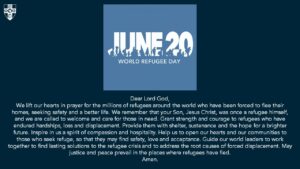World Refugee Day shines a spotlight on the plight of millions of refugees worldwide who have been forced to flee their homes due to conflict, persecution and violence. For Catholics, this day is a profound reminder of our Gospel call to welcome the stranger, extend compassion, and stand in solidarity with those who are marginalised and vulnerable.
The call to welcome the stranger is deeply embedded in the Judeo-Christian tradition. The Old Testament repeatedly instructs the Israelites to treat the alien residing among them with kindness and justice, reminding them of their own experience as strangers in Egypt. Leviticus 19:33-34 states,”When a foreigner resides among you in your land, do not mistreat them. The foreigner residing among you must be treated as your native-born. Love them as yourself, for you were foreigners in Egypt.”
In the New Testament, Jesus Christ reaffirms and deepens this call through His teachings and actions. In the parable of the Good Samaritan (Luke 10:25-37), Jesus challenges us to transcend boundaries of nationality, religion and ethnicity to show mercy to those in need. Furthermore, in Matthew 25:35, He identifies Himself with the vulnerable, saying, “I was a stranger and you welcomed me.” This profound identification with refugees and migrants calls us to see Christ in every displaced person and respond with love and hospitality.
Pope Francis has been a vocal advocate for refugees, consistently urging the global community to respond with compassion and solidarity. In his messages for the World Day of Migrants and Refugees, he emphasised the need for a culture of encounter, where we actively seek to understand and support those who have been displaced. He states, “Each migrant and refugee is a human being who bears the face of Christ and who we must respect and offer the opportunity to live in dignity” (Fratelli Tutti). This call to respect and dignify refugees challenges us to go beyond mere awareness, urging us to take concrete actions to support and integrate refugees into our communities.
Catholic social teaching provides a rich framework for understanding our responsibilities towards refugees. principles such as the dignity of the person, the common good, solidarity and the preferential option for the poor guide our actions and attitudes. The dignity of the person is the cornerstone of Catholic social teaching. Every person, regardless of their status or circumstances, is made in the image and likeness of God and deserves respect and compassion. This principle calls us to see refugees not as burdens, but as brothers and sisters in Christ. Solidarity calls us to stand with refugees in their struggles, advocating for their rights and supporting their integration into our communities. The preferential option for the poor urges us to prioritise the needs of the most vulnerable, including refugees, in our personal and collective decisions.
World Refugee Day is a powerful reminder of our Gospel call to love and serve the stranger. As Catholics, we are called to respond to the plight of refugees with compassion, advocacy and concrete support. By welcoming refugees into our communities and standing in solidarity with them, we bear witness to the transformative power of Christ’s love.


